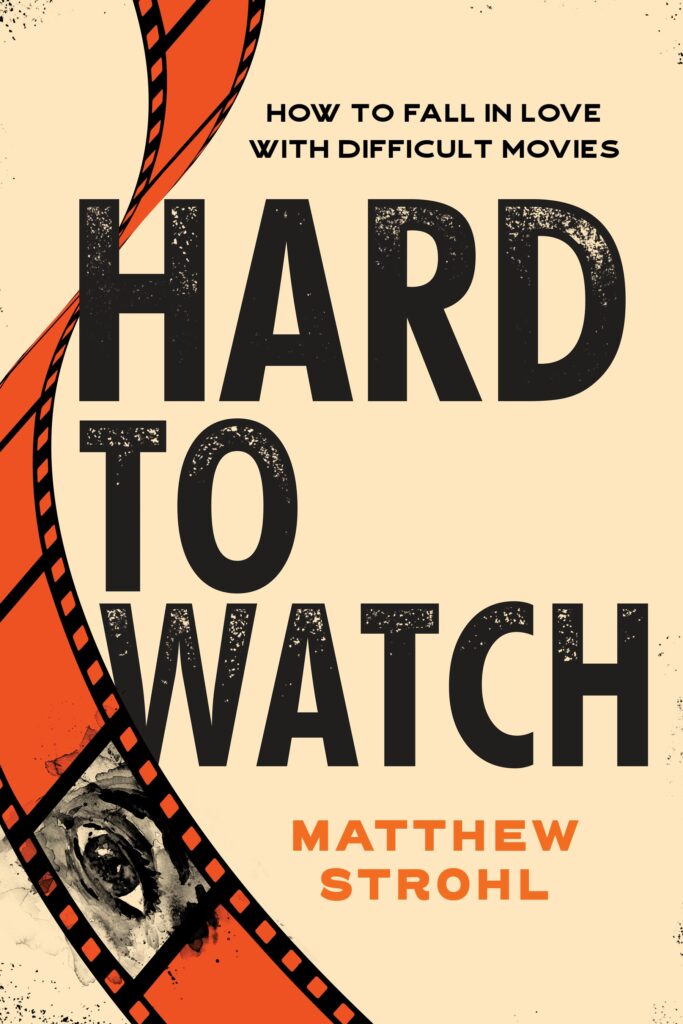With Clear, Considered, Approachable, and Chummy Prose, a Philosophy Professor Teaches Us ‘How To Fall in Love With Difficult Movies’
If the weakness of many philosophical texts is how readily they descend into illegibility and casuistry, the bonus of Matthew Strohl’s work is how it grounds serious thinking without denuding its complexity.

A professor of philosophy at the University of Montana, Matthew Strohl, has endeared himself to this critic by talking some serious smack about Rotten Tomatoes — you know, the website that aggregates critical opinion about cinema into a mush of selective quotations and bumper-sticker nostrums. Mr. Strohl’s thoughts can be found in his new book, “Hard To Watch: How To Fall in Love With Difficult Movies.”
Rotten Tomatoes, Mr. Strohl writes, “only takes account of whether … a given critic likes a movie, not how much they like it or whether they view it as a fun quickie or something meriting extensive study.” Nuance in aesthetic response is, in so many words, shuttled aside. But, one may ask, isn’t Rotten Tomatoes the cinematic equivalent of Consumer Reports? No, our professor of philosophy insists, because responses to a top-of-the-line blender are less bound by idiosyncrasy than vagaries in taste.
“Hard To Watch” is Mr. Strohl’s second book on popular culture, the first being “Why It’s OK To Love Bad Movies.” That one passed me by, but Mr. Strohl should be celebrated as a writer whose prose is clear, considered, approachable, and chummy. If the weakness of many philosophical texts is how readily they descend into illegibility and casuistry, the bonus of “Hard To Watch” is how it grounds serious thinking without denuding its complexity.
Consider the inclusion of philosopher Richard Holton and his ideas about the convolutions to which the rational mind is susceptible. Mr. Strohl notes how human beings “often form an intention with the full awareness that when the time comes to fulfill it, we won’t want to.” Mr. Holton dubs such prevarications, with what I assume is some irony, “resolutions.”

There are any number of objectives to which each of us, to one degree or another, thwarts our best intentions. Mr. Strohl’s subject being cinema, he underlines how often we, as audiences, are inclined to take the easy out: “If I leave my viewing decisions up to my day-to-day inclinations … [I’ll] just keep watching whatever junk catches my eye on Netflix.”
He’s right: After a tough slog at work, the last thing a reasonable person wants to do is plop down on the sofa, crack open a beer, and go about unwrinkling the hard-to-parse metonymies of Andre Tarkovsky’s “Stalker” (1979). Just give me “The Vampire Diaries” and let me be.
As it turns out, “The Vampire Diaries” is a favorite of Mr. Strohl’s, but his chief goal here is to convince us — to proselytize, really — that more demanding fare is worth the heavy-lifting. Not that all of us have the time to watch a film 10 times over in order to dissect its lacunae, as Mr. Stohl claims to have done so with Terence Malick’s “To The Wonder” (2011), “Knight of Cups” (2015), and “Song to Song” (2017).
Instead, a body should “adopt projects that fit well with open slots in their life.” Easier said than done, but good advice all the same — particularly for those of us whose curiosity is more capacious than our free time.
Mr. Strohl gets into stickier territory when delving into specifics. He devotes an entire chapter to Chantal Akerman’s “Jeanne Dielman, 23 quai du Commerce, 1080 Bruxelles” (1975). Film buffs may remember the kerfuffle that resulted when Akerman’s notorious and long picture was recently dubbed the greatest film of all time by the wits at the magazine Sight and Sound. Picking up on that cue, Mr. Strohl goes on to address “the question of boredom.”
It’s not our professor’s finest moment. Boring movies, we learn, “use boredom to open up forms of engagement that are closed off by less boring movies.” As you take a moment to untangle that thought, be aware that Mr. Strohl often employs extra-cinematic rationales and kaleidoscopic pontifications to bolster Akerman’s picture and, later, Andy Warhol’s “Empire” (1965). The emptier the vessel, it would seem, the more verbiage is warranted to fill the vacancy.
If Mr. Strohl errs on the side of giving dubious pictures more credence than they warrant — I mean, come on, sometimes a bad movie is just a bad movie — he’s commonsensical in doling out advice on the best way to navigate the bewildering abundance of entertainments typical of the 21st century. Think of your screen time “less like a brunch buffet and more like training for a marathon.” Set goals, start on modest terms, and “break with the inertia of … entrenched habits,” he says. Feel the burn, tune in, but don’t tune out and before you know it you’ll be giving “The Tall T” (1957) and, maybe, “Titane” (2021) a try.
However much he tends toward a soft form of relativism, Mr. Strohl shows himself to be an old school elitist — not a snob, mind you, but someone who believes that some pleasures are deeper than others. “Hard to Watch” is a rewarding read.

